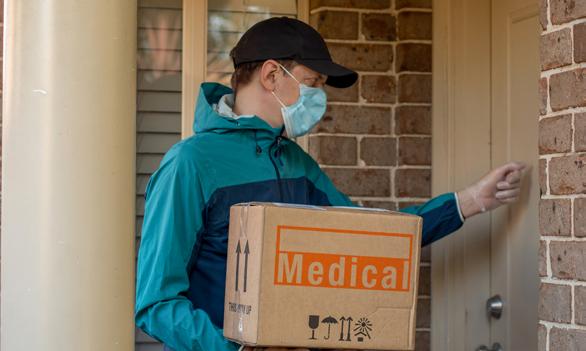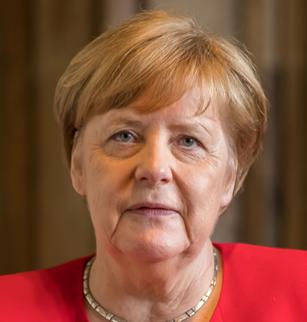
4 minute read
In other news
IN OTHER NEWS
BY CHARNDRÉ EMMA KIPPIE
TB: A neglected disease?
With too many cases going undiagnosed, emphasis must be put on curbing the rate of TB infections in South Africa
As the country champions through the second wave of the Covid-19 pandemic, we commemorate TB Awareness month, with World Tuberculosis (TB) Day taking place on March 24, to raise public awareness surrounding the detrimental effects of the disease on all pillars of our nation. At present, TB still ranks as one of the deadliest infectious diseases worldwide.
As per the World Health Organization’s Global Tuberculosis Report, released in October 2020, the African continent makes up an estimated 25% of the world’s TB burden, and of these global cases 3.6% are attributed to South Africa. Further research shows that an estimated 360 000 people in the country had contracted TB in the year of 2019. And numbers have been climbing throughout the Covid-19 pandemic due to lowered detection and diagnosis rates.
Working towards solutions
Last month, Health Minister Zweli Mkhize made a public announcement regarding measures being implemented to assist in the fight against the consequences of COVID19’s disruption to the country’s healthcare system, with specific reference made to the detection, treatment and prevention (where possible) TB in South Africa.
Recommendations provided by the latest Tuberculosis Prevalence Survey indicated that much more needs to be done in order to increase access to screening and testing services through outreach programmes.
“In addition, our rates of drug resistant TB, though declining, continue to pose a public health risk. The continued prevalence of TB has been mainly driven by the concurrent HIV epidemic, however, much has been gained in reducing the burden due to our high coverage with antiretroviral treatment”, said Mkhize.
“Access to health services is a constitutional right. As government, our commitment is to realize a long and healthy life for all our citizens.
This survey was undertaken to ensure that our services are responsive to the lived experience of our communities. There are lessons on community engagement and multi-sectoral partnerships that we can learn from provincial experiences, which we can take to scale.”
TB Survey Results
The report, released by the Human Sciences Research Council, indicated that there are many individuals with “undetected TB” in our
communities, and that individuals who display TB symptoms tend to delay seeking professional healthcare services and getting formally diagnosed. Also on the agenda, statistics show that a higher proportion of HIV negative people have asymptomatic TB than people living with HIV.
“This has been a key finding which will require a shift in the way we achieve proactive health seeking behaviour. Previously, we focused on symptomatic patients and those living with HIV. We now need to encourage everyone to screen and test for TB to achieve elimination,” Mkhize said.
“What is encouraging is that we have established a solid foundation for resilient emergency response systems. By implementing the recommendations, we will reinforce and elevate some of the key strategies we have learnt from our COVID-19 response.” Mkhize said COVID-19 has shown us many innovative ways of providing health services in an integrated manner for efficiency.
Innovative Approaches to TB in SA
• The leveraging of digital technologies for TB screening, contact tracing and treatment adherence. • The TB Health Check App which has been developed and can be accessed by dialing *134*832*5# or send ‘TB’ to +27600123456 on WhatsApp.This App provides an easy way for everyone to screen themselves for TB. • Home delivery of medicines for patients by community health workers and inclusion of TB medicines in the CCMDD system. • Integrating TB and COVID-19 testing using Gene Xpert technology.
Mobile TB technology
DigiTB, an app developed by the Centre for Community Technologies at Nelson Mandela University, has been the light at the end of the tunnel for South Africa recently.
This new mobile technology enables healthcare workers to track, trace, regularly follow up, and oversee tuberculosis patients - eliminating the need to physically go out into communities. Since the app allows for monitoring patients from a distance, the risks of contracting other infections, such as Covid-19, as well as criminal occurences in the field, are significantly reduced.
For now, the app is being circulated on a small scale in areas such as Wells Estate, Port Elizabeth, and will also be introduced in the Western Cape - as per the South African National Tuberculosis Association (Santa).
SIGNS AND SYMPTOMS of Tuberculosis
coughing up blood fever chest pain chills weight loss
long-term cough no appetite fatigue night sweats
What the recent stats show:
Locally
• Tuberculosis (TB) is second only to HIV/AIDS as the greatest killer worldwide due to a single infectious agent. • In 2019, a total of 58,000 people died of TB. Of these it is estimated that 36,000 were HIV positive. • KwaZulu-Natal, the Eastern Cape and the Western Cape have had the highest incidence rates in South Africa since 2015.
• TB is estimated to decrease South Africa’s yearly GDP by between 2 and 3%. • The country recently reported a 50% drop in the number of detected and diagnosed cases of
TB, between March and June 2020, during the Covid-19 pandemic.
Internationally
• More than 95% of TB deaths take place in low- and middle-income countries, and it is among the top three causes of death for women between the ages of 15 and 44. • 484 000 people proved to be resistant to rifampicin (the most effective first-line drug) globally in 2018, of which 80% had Multidrug-resistant Tuberculosis (MDR-TB). • According to the WHO, 3.3 billion US dollars is needed annually to fill the resource gap for actioning existing global TB interventions. n











